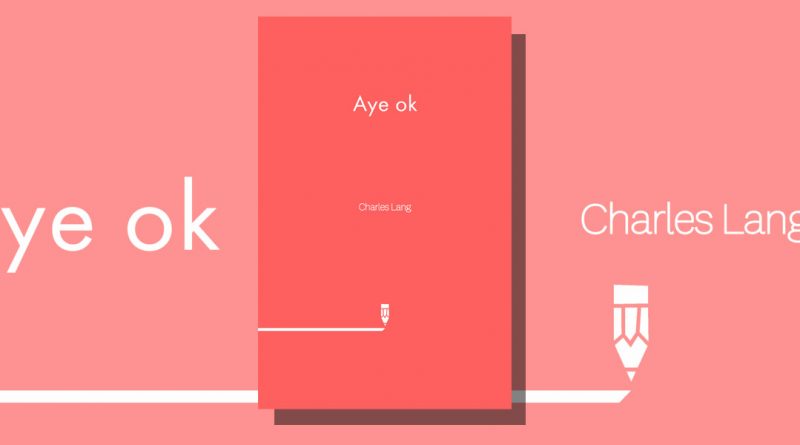Aye ok by Charles Lang
-Reviewed by Genevieve Stevens-
I first came across a poem of Lang’s a few months back in The Rialto. Its short, deft lines, fizzing off the page, ‘the birds n the trees / n the binmen bouncin / bins aboot the street’ made me feel a bit light-headed. I wrote immediately to Lang and asked to review his pamphlet Aye ok; I wanted to get drunk.
By writing in his native Glaswegian dialect, Lang holds the baton passed down from fellow Glaswegian poets Liz Lochhead and Tom Leonard, whose alert and inquisitive poems — I’m thinking in particular of Leonard’s ‘Six O’Clock News’ and Lochhead’s ‘Kidsong/Bairnsong’ stand firmly at the provocative intersection of language, class and power: ‘Oh saying it was one thing’ Lochhead writes, ‘But when it came to writing it / In black and white / The way it had to be said / Was as if you were posh, grown-up, male, white and dead.’ Though the working class Glasgow that Lang is writing from and into looks a little different today, the pressure of ‘the way it has to be said’ persists. Lang’s poetics expose these tensions by making frequent tears in the the surface of the poem so that both languages (the spoken Glaswegian and English taught at schools) jar side by side, charging the poetry with political heat.
An initial read of Aye ok, for a non-Glaswegian, is demanding. Familiar words are truncated, hyphenated, phonetically re-calibrated so that your eyes have to press hard into the page to keep up with its music: ‘Oan a train got tae Dresden, / an auld wummin talks / tae me in German / n I’ve nae idea wit / she’s sayin.’ But pretty quickly you find yourself bouncing along with its binmen, enjoying Lang’s upbeat, resilient vernacular. And it must be read out-loud, for only then does the jarring notation of both languages hit home. Consider the sonic gulf between ‘watter’ and ‘water’ in this extract from ‘Education’: ‘Before I went tae school / watter wis water / n water wis…wit? / wit’s water? It’s water.’ Whereas ‘watter’ slaps, asserts, says all it has to say in the first half of the word (the ‘er’ barely audible), ‘water’ is laboured, plodding, a slight emphasis at the front, but nothing brave. Placed alongside each other in this extract, their difference amplifies – say the lines quickly out loud and the more athletic and excitable watter becomes next to its sluggish eeyore ‘educated’ water. The poems in Aye ok seem to understand the world like this, as a sort of irresolution of opposing versions of the same reality.
Though far from a narrative arc, there is a coming of age trajectory to this pamphlet; a movement from the group to the individual. The former is noisy, resilient, jostling and sarcastic, where identity and masculinity are played out against the expectations of the society beyond. The latter is questioning and quieter but still with the same Candide-esque ‘nae bother’ shrug. Lang’s poems privilege moments of transition and translation, which is often just the monumental effort of growing up and away, of using the right words to engage and the right ones to abandon, of figuring out how to remain true to where you’ve been in a place that doesn’t understand it. Lang’s judgement is well placed in this regard; his poems perform the difficulty of balancing belonging and dispossession, self and society, the lads and the solitude.
I’m drawn to these quieter poems; where Lang attention funnels into a small moment and extracts from it something lyrical and tender. It’s as though, for these brief moments, he loosens his grip on the fight inherited from Leonard and Lochhead and takes time out, on his own, to sit and watch. ‘An Old Woman’ has the narrator ‘Sittin staring at the wee clock / ye used tae hub in yer livin room, / I realise aw the things ye’ve missed / n the hings, like the clock, / that miss you — ’. It’s a moving scene; the lack of the clock’s ticking foregrounded before the following stanza, where Lang takes us gently with his thinking:
I wonder whether ye’ve seen
wit’s happened tae the world
n wit’s happened tae ma ma – the illness
n that, n how she’s gradually becomin
an auld wummin: wee, frail, forgetful,
a bit like yersel. But that’s only because
she’s no well, n she’ll get better soon.’
I’m excited to see how Lang develops this aspect of his voice, one that internalises the linguistic tensions and explores them by means of psychic turbulence; what is the cost of not saying something, of performance, or the impact of wilful dispossession, where does it leave you? It’s touched on in ‘Visitors’ where the speaker, wondering around Camden with a friend, sits down for a pint of Camden Pale Ale, ‘Look at us’, says the speaker, ‘Who dae we think we ur?’ For now this voice has caught me, and I for one will be watching to see how it’s playful buoyancy continues to interpret the world, not just through the prism of the language that is used (or not used), but also what that language endeavours to describe, ‘the whole lot ae it’.



an amazing review of an amazing book of poems. Reading through each one my memories and emotions come alive, by recognising and relating to the words,the language and the history behind each one.
A true talent that can only be described as pure genius.